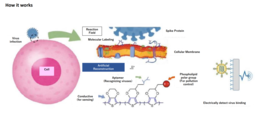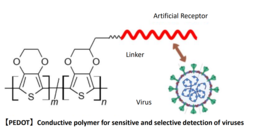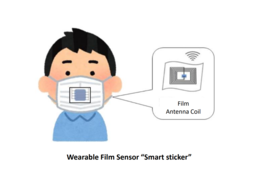Medical Engineering Collaboration / Life Sciences
Battery-free thin-film virus sensor
Overview
Organization Name
Tatsuro Goda,Professor, Toyo University
Details
Key Point
- Our material enables specific detection of target biomolecules, proteins, and virus.
- Artificial receptors provide high robustness, durability, and storage stability of the detector.
- High sensitivity is achieved by suppressing nonspecific adsorption.
Benefit
In recent years, with the outbreak of communicative diseases such as the new influenza and the COVID-19, we are regularly threatened by viral infections. For the prevention of pandemics, it is effective to quickly and accurately identify viruses and respond to them. However, conventional methods for detecting viruses, such as immunological and genetic analysis techniques, have issues related to sensitivity, time, and cost. Moreover, there’s the infrastructural issue that one cannot get diagnosed without visiting a hospital, which is insufficient to proactively prevent the spread of virus infections. Given this backdrop, our technology aims to develop an electric virus detection method that is compact and portable, offering high sensitivity and accuracy. It allows for on-the-spot (point-of-care) diagnostics, as well as wearable and implantable diagnostics.
Market Application
The conductive polymer (PEDOT) has high electrical conductivity, is chemically stable, and doesn’t contain any rare or harmful elements. Since it can be applied or modified as an ink, functionalized conductive polymers with virus recognition elements can be printed on paper or non-woven fabric. By using it as the detection part of an electrical sensor, it is possible to detect viruses in saliva or droplets using a simple point-of-care device. There’s also potential to detect viruses floating in the air in an aerosol form.
Publications
- W. Hai et al., ACS Appl. Mater. Interfaces, 2017, 9, 14162-14170.
- https://doi.org/10.1021/acsami.7b025232. T. Goda et al., Langmuir, 2019, 35, 1126-1133.
- https://doi.org/10.1021/acs.langmuir.8b01492



